Iran’s FM Issues Renewed Threats To Israel If Attacks On Gaza Continue
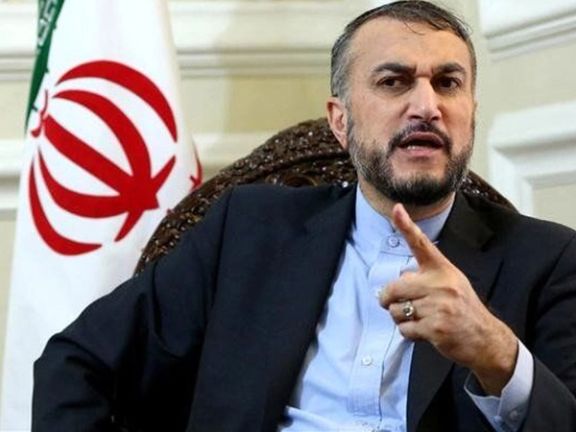
Iran's Foreign Minister Hossein Amir-Abdollahian issued another threat on Wednesday, warning that there could be "harsh consequences" if attacks on the Gaza Strip continue.

Iran's Foreign Minister Hossein Amir-Abdollahian issued another threat on Wednesday, warning that there could be "harsh consequences" if attacks on the Gaza Strip continue.
Iran has been vocal about its support for its proxy Hamas in the Gaza Strip, which declared war on Israel on October 7 when it murdered 1,400 mostly civilians and took 239, also mostly civilians, hostage. The foreign minister has said clearly that the regime has its hand on the trigger should Israel's subsequent bombardment cease.
"If an immediate ceasefire doesn't take place in the Gaza Strip and the rapid attacks by the US and Zionist Regime continue then the consequences would be harsh," he said in Ankara during a news conference in Ankara with his Turkish counterpart.
He also claimed an upcoming visit to Turkey by Iran's President Ebrahim Raisi is on the agenda. Both Iran and Turkey called for a regional conference to address what they claimed aimed to prevent the escalation of the Israel-Hamas conflict, in spite of both agitating for its escalation. Turkey's Foreign Minister Hakan Fidan emphasized the need for an immediate ceasefire to avoid further violence in the region and expressed concerns about the humanitarian impact of the conflict.
Iranian proxies have attacked US facilities in the region and its proxies in Yemen, Lebanon and Syria have fired on Israel in support of Gaza-based Hamas, designated by countries including the US, UK and Australia.

A seasoned pundit in Iran says the hardliners have sidelined reformists from Iran's political landscape and are now trying to target three major conservative groups.
Reformist commentator Abbas Abdi believes that the ultraconservatives are working to marginalize traditional clerics, traditional conservatives, and the so-called neo-cons around Majles Speaker Mohammad Bagher Ghalibaf in preparation for the upcoming parliamentary elections in March.
He suggests that this plan to eliminate or, at the very least, silence these three conservative groups will contribute to greater inefficiency within the Iranian government. This inefficiency, in turn, is likely to lead to increased dissent and exacerbate the existing political impasse in Iran. Abdi argues that continued political purification will disrupt the current political balance, potentially reaching a point where conflicts and clashes become inevitable.
The prospect of facing political purification in Iran is taken very seriously in the country's political circles. Even political heavyweight and senior member of the Expediency Council, Mohammad Reza Bahonar, who is running for the next parliament, expresses concerns about potential disqualification by the hardliner Guardian Council. He fears that despite his non-official position within the government, he could be eliminated from political participation. Bahonar also believes that the Guardian Council should consider endorsing the qualifications of reformist figures who oppose conservatives. Bahonar suggested that a politician such as former Foreign Minister Javad Zarif could be the leading figure of a list of reformist candidates.
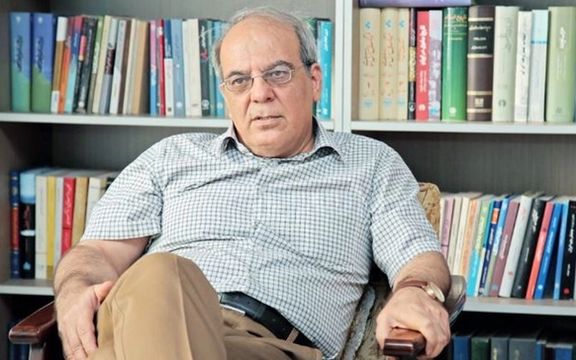
In the 2020 parliamentary and 2021 presidential elections, the Council disqualified hundreds of candidates for no real reason, including top challengers of Ebrahim Raisi, who then glided into the presidency in a low-turnout vote.
According to Khabar Online website, Bahonar, although somewhat removed from everyday politics, still wields significant influence in the Iranian political landscape. There is talk of him contemplating the creation of an all-encompassing political party with members from across the political spectrum, even though he acknowledges the possibility that ultraconservatives might try to eliminate him from the political scene. He has suggested that figures like Javad Zarif and Ali Larijani could play leading roles for reformist and moderate conservative candidates.
Another member of the Expediency Council, Mohammad Sadr, criticized Iran's hardliners who label themselves "revolutionaries" and questioned the meaning of being a revolutionary after a revolution. He referred to some hardliners who supported the controversial hijab bill as "possible infiltrators" and highlighted that the revolution has generated numerous challenges. Sadr emphasized that being a revolutionary should not be confused with being a radical.
He charged that "Many demands for which we took part in the revolution have not been met. These include the calls for freedom and justice."
In another development, Entekhab news website quoted former President Hassan Rouhani as saying that "Many people have become disillusioned and turned their backs to the regime because they saw that some of the promises made by officials were baseless." He insisted that in such a situation it is essential that political parties are allowed to be active and represent various groups of people."
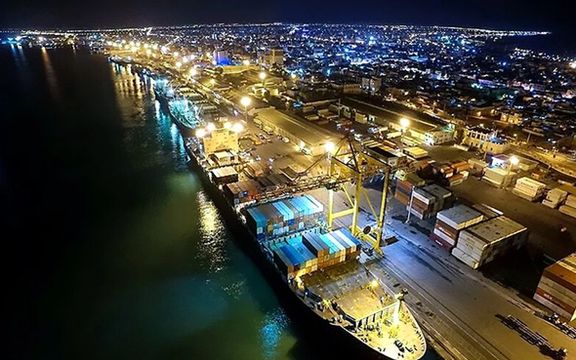
The Iranian Customs Authority has reported that the foreign trade balance for the first seven months of the current Iranian year has reached a negative eight billion dollars.
According to the official report, during the seven-month period ending on October 22, Iran's non-oil exports amounted to 28.3 billion dollars, while imports reached 36 billion dollars. The substantial trade deficit has raised alarms among economic experts and policymakers.
Meanwhile, the trade balance deficit in the initial seven months of this year has more than doubled compared to the same period in the previous year, highlighting the severity of the situation.
The worsening trade balance, coupled with shifts in the international political landscape, primarily due to escalating tensions between Iran and the United States over the Israel-Hamas conflict, has fueled concerns among Iranian media and economic activists regarding the future exchange rate.
Donya-e-Eqtesad newspaper has issued a warning that if the trend continues, it could force a currency devaluation in Iran. The newspaper also predicts that Iran's exchange rate balance will remain negative in the remaining months of the year.
Former Central Bank Governor Abdolnasser Hemmati has openly criticized the Central Bank's policies regarding exchange rate changes. Hemmati expressed his concerns, stating that efforts to stabilize the exchange rate without addressing inflation might lead to rent-seeking, more capital flight, and renewed currency shocks.
Ham-Mihan, a pro-reform daily, made a grim prediction on October 17, suggesting that if revenue realization in the second half of the current year follows a pattern similar to the first half, the budget deficit could double compared to the previous year.
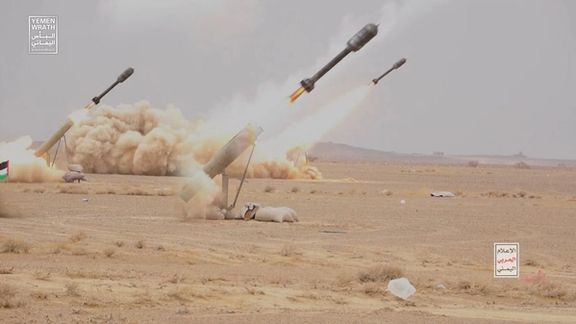
The Israeli military announced on Wednesday that it had deployed missile boats in the Red Sea in response to recent attacks carried out by the Iran-backed Houthi militia.
The deployment comes a day after the Houthi rebels claimed responsibility for launching attacks towards Israel and pledged to continue.
Images released by the Israeli military showed Saar-class corvettes patrolling near the Eilat port in the Red Sea. Israel views this region as a new front in the conflict as its ongoing war in Gaza has drawn retaliatory actions from Iran-aligned pro-Hamas forces throughout the region from Lebanon and Syria.
The Houthis disclosed that they had launched three drone and missile attacks against Israel since the beginning of the Hamas-Israel conflict which began on October 7 when thousands of Hamas militia invaded Israel killing at least 1,400 mostly civilians and kidnapping 239 more. Some have been intercepted by the US and Saudi Arabia and Tuesday's attacks also did not enter Israeli territory.
Like Iran's other proxies, the Houthis have vowed to carry out additional attacks in support of the Palestinians.
The Houthi movement, which seized control of Yemen's capital Sanaa in 2014 and holds significant territory in the country, considers itself part of the "axis of resistance" against Israel.
The Israeli military spokesperson emphasized that the primary focus remains on the Gaza Strip. "There are many actors in the region who operate as Iran proxies, such as the Houthis, who are trying to challenge us and distract us from the war in Gaza. We remain focused," said Rear Admiral Daniel Hagari.

The United States has denounced the Iranian authorities' violent assault and unjust detention of several human rights defenders during the funeral of Armita Geravand.
Armita, 16, fell into a coma on October 1 after a violent encounter with hijab enforcers in the Tehran subway. While the government's attempts to obscure the incident's details, it appears she was pushed by a female agent, leading to a severe head injury.
Amid the mourning at Armita's funeral, several human rights defenders, including the renowned lawyer Nasrin Sotoudeh and other peaceful activists, were arrested.
In a statement issued on Tuesday, the State Department expressed its condemnation of the Iranian regime's treatment of its own people, especially its campaign of violence against the country's women and girls. The statement read, "The United States will continue to stand with the brave people of Iran and work with the international community to hold the regime accountable for its human rights abuses at home and abroad."
Security measures were put in place to prevent the dissemination of information around the young girl's death which echoed that of Mahsa Amini over a year ago, which triggered nationwide unrest across Iran. State security imposed a blackout on all photographs and CCTV footage from the scene on the subway and at Tehran's Fajr Hospital. Armita was declared brain dead and passed away in the hospital on Saturday.
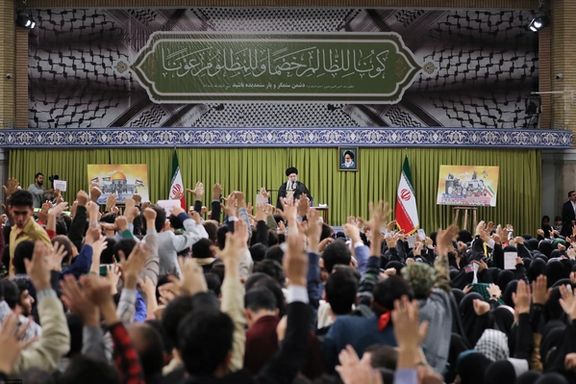
Iran's Supreme Leader has called on Muslim states to cease oil, food and goods exports to Israel to make it stop bombing Gaza following the October 7 Hamas attack.
Ali Khamenei made the remarks during a speech on Wednesday stating, "The bombings on Gaza must stop immediately ... the path of oil and food exports to the Zionist regime should be blocked."
Israel seeks to wipe out Tehran-backed Hamas, which rules Gaza, in retaliation for the terror attack last month that killed 1,400 people and saw more than 200 hundred taken hostage. The Israeli military has launched a retaliatory campaign that extended to a ground offensive last week. Hamas authorities in Gaza say more than 8,000 people have been killed, but the figure is not independently confirmed and can be part of the Islamist group’s psychological warfare.
"Muslim states must not cooperate economically with the Zionist regime, but denounce these catastrophes and crimes vociferously and without hesitation in all international forums. The scale and circumstances of what is going on must be clarified. The Zionist regime must be condemned, and the entire Muslim world must be mobilized against it,” Iran's authoritarian ruler added.
Iranian regime officials have repeatedly warned Israel of an escalation if it failed to end attacks against Gaza, threatening that Tehran’s proxies in the Middle East were ready to act. Attacks by Iran-backed militia groups in Iraq and Syria have increased against the bases hosting US forces in Iraq and Syria, while Hezbollah from Lebanon and Houthis from Yemen have also increased their missile launches against Israeli targets. The US military said Tuesday that over two dozen attacks were launched against its bases.
Khamenei repeated his customary rhetoric that the United States was complicit in Israel's "recent crimes against Palestinians".
"If it weren't for America's support and its military backing, the corrupt, fraudulent, and deceitful Zionist regime would have collapsed in the very first week” of Operation al-Aqsa Flood (Storm in Persian), the codename for Hamas’s multi-thronged surprise attack on Israel.
"The Islamic world should not forget that in the crucial issue of Gaza, those standing against the oppressed Palestinian nation were the United States, France and Britain," Khamenei said to chants of "Death to Israel" and "Death to America".
He defended the slogans and said, "Today, mass demonstrations are taking place even in the streets of the United States and Western countries, protesting against Israel and, in many cases, against the United States.”
British newspaper The Times revealed last week that Tehran is behind the protests as it tries to escalate tensions against its archenemy Israel amidst its war with Hamas. The demonstrations have also raised serious questions about the UK’s dealings with extremism in a year when the UK’s top security and political chiefs admitted that Iran remains one of the UK’s biggest threats.
Referring to reports about Iran’s involvement in stirring up unrest in the several countries through Gaza protests, Khamenei said that attributing the rallies to Iran is out of desperation, quipping that “perhaps these gatherings are the work of the London Basij and the Paris Basij!" Basij is the paramilitary volunteer-based wing of Iran’s Revolutionary Guards that organizes regime-sponsored rallies in Iran in line with the Islamic Republic’s policies and propaganda.
Khamenei's decision to publicly respond to these charges is interesting and shows his sensitivity to being accused of fomenting unrest in the West.
The octogenarian ruler intentionally ignored the fact that the Islamic Republic has several such bases in Europe that operate under the guise of Islamic centers and mosques and are directly run by representatives of Khamenei. Since earlier this year, at least two of these centers in German cities of Hamburg and Frankfurt as well as another one in the UK have been under scrutiny for their links to the regime and holding events to radicalize Muslims.
Israel, which Tehran refuses to recognize, has long accused Iran's clerical rulers of stoking violence by supplying arms to Hamas, controlling the Gaza Strip and to militants in Syria and Lebanon. Tehran says it gives moral and financial as well as logistical support to these groups.
"One of the shameless acts of the West is accusing Palestinian fighters of terrorism," Khamenei said, despite clear evidence that the latest Hamas invasion of Israel was designed to kill as many civilians as possible.
Iranian Foreign Minister Hossein Amir-Abdollahian, who is in Turkey to discuss the Hamas-Israel war in Gaza, reiterated threats of escalating the conflict unless Israel halts its offensive. During a Wednesday press conference with his Turkish counterpart Hakan Fidan, he said that if the war goes on, the resistance forces – regime's term for its regional proxies – will decide on another surprise attack.
Also on Wednesday, Iran’s Interior Minister Ahmad Vahidi described the attacks against US targets in Syria and Iraq as a natural reaction to Washington’s support for Israel in the war against Hamas. “Israel carries out these crimes in Gaza with the green light of the United States,” he said, stating that Muslims are concerned, and Americans may be targeted by whoever that deem the US as the main culprit. He claimed that such attacks are unrelated to Iran.
Updated and completed at 14:00 GMT